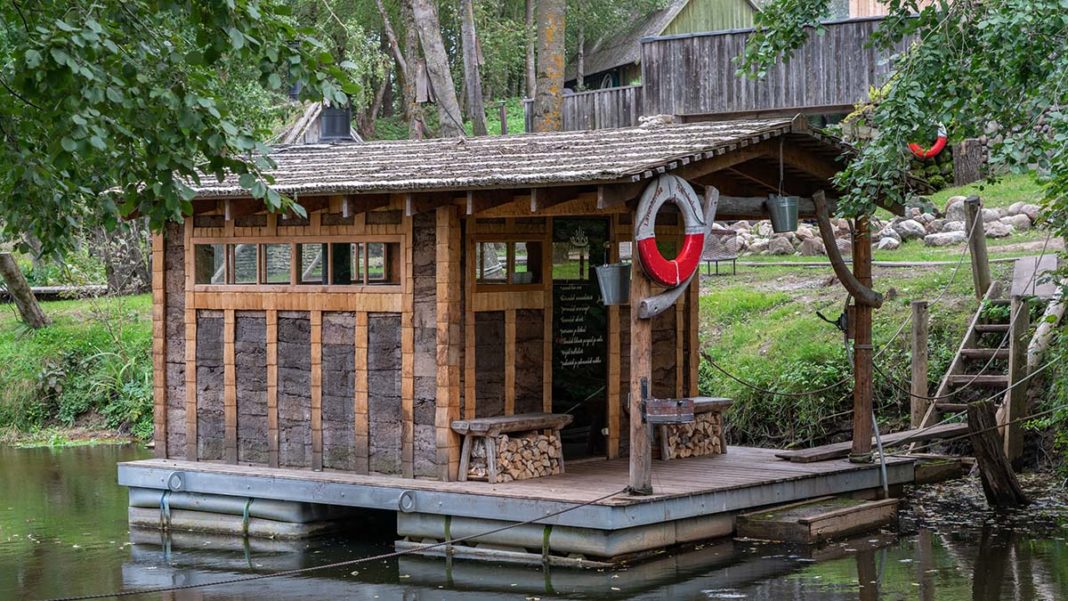MANITOULIN—While floating container dwellings have not been seen in the waters around Manitoulin Island thus far, they have become prominent in southern Ontario, but not without controversy. At least one municipal and one First Nation leader have indicated they do not want to see them around the Island.
A bulletin notice posted on the Environmental Registry of Ontario (ERO) indicates the Ministry of Northern Development, Mines, Natural Resources and Forestry (MNR) is seeking public input on ideas to inform possible future regulatory amendments related to “camping” on waterways and the use of floating accommodations over Ontario’s public lands.
“It hasn’t happened up here yet, with floating cottages or big barges with full cottages on them docking around the Island,” said Al MacNevin, mayor of the Town of Northeastern Manitoulin and the Islands (NEMI). “We sit on the Georgian Bay Association Coastal Protection Committee. The MNR is looking for input and feedback, and our council passed a motion stating we don’t want them to allow seasonal cottages on barges.”
Patsy Corbiere, chief of Aundeck Omni Kaning First Nation and chair of the United Chiefs and Councils of Mnidoo Mnising, told The Expositor, “There is lots of private land on the Island and there are ongoing land claims. I want a cap on Manitoulin Island. I don’t agree with these floating accommodations.”
Sewage and waste are leaked or dumped into the water, she said. “I definitely don’t think we should support these floating cabins, especially in rural, remote areas. Keep in mind that the ministry already has very limited staff and has difficulty monitoring hunting, poaching and fishing infractions due to a lack of resources.”
Chief Corbiere doesn’t see floating accommodations as a benefit to the people of Manitoulin. “These will be run by large corporations which won’t pay taxes on the Island. There would probably be an objection from First Nations about people using lands that do not belong to them. And what will happen to our shorelines if this is allowed to take place? Shorelines are part of our land claims.”
She also pointed out that floating accommodations in the North Channel would have an economic impact by taking business away from marinas and town docks. “They would be taking away tourism and accommodations from our businesses on the Island.”
“What happens if people on these floating accommodations have medical problems?” she asked. “It’s not good for municipalities, First Nations or businesses. There are side effects.”
Mayor MacNevin said it was through the GBA coastal protection committee that he first heard of companies that are building floating cottages designed to anchor offshore as a summer rental. “It would be creating a lot of issues for shoreline residents and municipalities,” he said. He has asked MNR for input into the issues caused by these floating accommodations.
It is confusing for municipalities because they normally control the land, not the water. “My understanding is that the ministry has control over land under the water,” said Mayor MacNevin.
“There is also confusion on whether this is a vessel or not,” he added. “Even a barge without a motor is considered a vessel. Transport Canada determines the regulations for vessels.”
“We don’t want to discourage tourism, but when seasonal cottagers are already there, paying taxes and taking care of their sewage and wastewater, people staying on the water, in front of or close to their properties, can cause aggravation,” Mayor MacNevin said. “Our council has agreed we don’t like the idea of (floating cottages) parking offshore and creating environmental problems, not paying taxes, and aggravating cottage owners who do pay taxes.”
One Ontario community that has already had dealings with floating accommodations is the Township of Georgian Bay. Mayor Peter Koetsier told The Expositor last week, “other than those who want to buy or sell them, no one wants them. We have a guy in Port Severn that manufactured one and is trying to build more. He floated one of these in our water last summer and I can tell you, the neighbours were not happy at all.”
“It’s a complicated issue because it includes the provincial, federal and municipal governments,” Mayor Koetsier said. “Part of the challenge is the federal government has control over navigable waters, the province has control over Crown land and the lake bottom in most areas, and the municipalities control private lands.”
“One of the selling points for those selling these floating cottages is that they don’t have to meet regulations, don’t have to pay property taxes, and you can anchor these things anywhere and later anchor in another area,” he said. “We also have great concerns with the dumping of grey water into our lakes.”
The township already experiences some problems with regular yachts coming very close to residences. The manufacturer in Port Severn is also using floatation materials under the containers that are breaking down in the water. “Part of the challenge is that basically, these things are ugly,” said Mayor Koetsier. “They consist of two or three shipping containers on a base on a barge, and (the Port Severn unit) wasn’t motorized.”
“Do we need further restrictions? It’s a challenge many existing neighbours don’t want to see. They are producing garbage and waste, and are aggravating landowners in some cases by interfering with the view and peacefulness of people who own cottages on the land and pay taxes on them.”
Mayor Koetsier said township staff is looking into possibly creating new bylaws against the floating accommodations, “but again, there’s a concern that if a municipality designs a policy that isn’t perfect, then no yachts can dock in our waters either. And no one wants to lay charges that might not stand up in court.”
Georgian Bay Township does have an existing bylaw where using a floating structure as a dwelling unit is an illegal use; it’s part of the township zoning bylaw. “The municipality reserves the right to take enforcement actions as deemed appropriate to ensure compliance with the zoning bylaw,” said Mayor Koetsier. “We want the province, federal government and the OPP to be on board with all of this.”
He added, “This guy listed his containers for sale as $1 million floating condos that move around, so buyers don’t have to buy property or pay taxes and can move. I think people have been tempted. One concern is overuse of our waters and if these containers are allowed, it will mean even more use of our waterways.”
The ERO bulletin notes that consultation is not required on the issue as no regulatory changes are being proposed at this time. Input gathered from this process will inform the consideration of potential changes intended to address growing concerns around the impacts of this activity on Ontario waterways and those who use them. Any policy or regulatory change would be subject to public consultation.
MNR is aware of concerns regarding the “prolonged and indeterminate occupation of floating accommodations and related potential impacts” that include, wastewater management, application of building permits, duration of use, advertising, increasing human pressures on waterways, impeding access to public land and waterways, and lack of payment of property taxes.”
The Public Lands Act and Ontario Regulation 161/17 provides that individuals are allowed to camp on public lands, which includes waterways over public lands. Rules include that the camping be private and non-commercial, for a maximum duration of 21 days at one location each year after which the camping unit must move at least 100 metres from its previous location, and the occupied public lands are not part of a road, trail, parking lot or boat launch. The camper must be a Canadian citizen or resident, otherwise a permit is required. The public lands being used are not already occupied and camping is not prohibited on those lands.
Boaters may exercise their right of navigation, including reasonable moorage, but if not using a camping unit or navigating, occupational authority or permission is required from the ministry.
“We are seeing a change on Ontario’s waterways,” the bulletin states. “Over the years, the use of provincial waterways by watercraft has expanded to include floating accommodations, which are designed primarily to provide accommodation for longer stays (ie., similar to a cottage) and not for navigation or camping purposes.”
The ministry noted it is aware of public concerns over floating accommodations on waterways over public lands and is accepting public feedback until April 19. Additional information can be found on the Environmental Registry of Ontario (Bulletin number 019-5119) and responses can be emailed to public.lands@ontario.ca.





